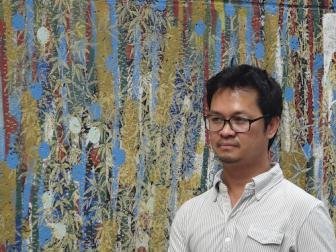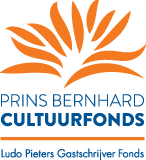Poet
ko ko thett

ko ko thett
(Burma, 1972)
© Lut Lams
Biography
Poet, translator and editor ko ko thett was born in Rangoon (Yangon) in 1972. In 1995, whilst studying engineering at the Yangon Institute of Technology (YIT), thett began editing and publishing ‘Old Gold’, a campus samizdat in Burmese. In the aftermath of Funeral of Old Gold, his second chapbook, he was arrested and detained for his involvement in the December 1996 student uprising. After his release in April 1997, he left both YIT and Burma for Singapore and then Bangkok, where he spent three years working for the Jesuit Refugee Service Asia Pacific. In 2000, thett went to Finland where he took up peace and conflict studies at the University of Helsinki, before finally moving to Vienna to study with Wolfram Schaffar at the Institute for International Development at the University of Vienna. In late 2015, ko ko thett returned to his native Rangoon. After a residency at the International Writing Program at the University of Iowa in the fall of 2016, and a book tour in the US, thett has been resettled in Sagaing, in central Myanmar, since 2017. He is the Burmese editor for the Poetry International website and co-editor and translator of Bones Will Crow: 15 Contemporary Burmese Poets, an anthology of Burmese poetry, recipient of the 2012 English PEN Writers in Translation Programme Award and one of '10 books that chart the country's tumultuous history', according to The Guardian. His book of poems, The Burden of Being Burmese (Zephyr, 2016) , the first ever full-length collection in English by a Burmese poet, is listed on World Literature Today’s Nota Benes.
thett describes the Burmese situation as a ‘no-progression draw . . . [n]o one can eliminate the other so the country cannot progress’. The Burden of Being Burmese aptly expresses the predicament of this static Burmese dialectic, and it does so through an oscillation between the personal and the political, resorting to a paratactical stylistics invoking the work of Buddhist poets such as Chögyam Trungpa. It is often also reminiscent of the Zen koan, a paradoxical question that knows no answer. However, thett’s paratactic writing style might just as well be an attempt to translate the tonal, syllable-timed nature of the Burmese language into English. In any case, one could say that, like the parable of the blind men and the elephant in ‘blindfolded brahmins’, The Burden of Being Burmese constantly aspires to reach middle ground, to touch upon boundaries – between subjects, languages, localities – in hope of dissolution, but, most importantly, in resistance against totalitarianism.
© Jonas van de Poel
BibliographyENGLISH
Poetry
Four Poems, a craft book of ko ko thett’s poetry in Burmese and English, The Green Violin, Canada, forthcoming (winter 2018)
The Burden of Being Burmese, Zephyr Press, US/Hong Kong 2015
Selected anthologies
Supplement (Issue 2), curated by Ariel Resnikoff and Orchid Tierney, Creative Writing Program & Kelly Writers House, University of Pennsylvania, 2018
CAPITALS: A Poetry Anthology, edited by Abhay K, Bloomsbury India, 2017
Best American Experimental Writing 2016 [BAX 2016], edited by Seth Abramson, Jesse Damiani, Tracie Morris & Charles Bernstein, Wesleyan University Press, 2017
The Borderlands of Asia: Culture, Place, Poetry, edited by Mark Bender, Cambria Press, NY, 2017
Translation and editing
Nobody Represents Me, a pamphlet of Zeyar Lynn poems, Clinic Publications, UK, 2018
A Little Vase of Light Verses by K Zaw (The Eras Books, Yangon), 2016
21 Poems by Khin Zaw Myint (The Eras Books, Yangon), 2015
Bones will Crow: 15 Contemporary Burmese Poets co-edited with James Byrne, ARC, UK 2012 & Northern Illinois University Press, US 2013
BURMESE
Poetry collections
(Titles translated into English by the author)
ACCENT, Seikku Cho Cho Books, Yangon, 2018
Foo Foo Thett’s Page on an Internet Dating Site, Sour Dry Bitter Books, Yangon,
2016
Translation
True Love, Selected Poems by Wislawa Szymborska, based on the English translations by Clare Cavanagh and Stanislaw Baranczak, (The Eras Books,Yangon), 2018
[Since 2012, ko ko thett’s work has been routinely featured in contemporary Burmese poetry anthologies published inside Myanmar.]
Links
Author's website
From the Archive of Censored Materials at PEN Samples on English PEN
The Guardian’s Review of Bones Will Crow
The Guardian's top 10 books on Burma
Zephyr Press
PODCAST: The burden of being Burmese - an interview with ko ko thett
Poems
Poems of ko ko thett
Sponsors





Partners
LantarenVenster – Verhalenhuis Belvédère

